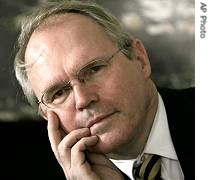2007年VOA标准英语-US Talks with North Korea Move Forward(在线收听)
New York City
08 March 2007
watch report on US/North Korea Talks
The United States and North Korea held a first round of historic talks in New York earlier this week aimed at establishing normalized, diplomatic relations between the two countries. The U.S. negotiator, Ambassador Christopher Hill, is upbeat about the nature of the discussions. He also admits the hardest part -- verifying that North Korea is dismantling its plutonium production capabilities -- is still ahead. VOA's Kane Farabaugh has more from New York.
It is the first stage of an agreement between North Korea and the United States to hold discussions that could bring about an end to North Korea's nuclear weapons capability. The talks are also a chance to discuss a formal end to the 1950-1953 Korean War, and normalized, diplomatic relations between two former enemies.
 |
| Christopher Hill (16 Feb 2007) |
The next level of discussions between the two countries is aimed at verifying that North Korea is shutting down its Yongbyong nuclear reactor and allowing International Atomic Energy Agency inspectors to return to the site. North Korea gets 50,000 tons of fuel oil by satisfying these requirements.
North Korea would also receive close to one million tons of fuel oil as well as other economic and humanitarian assistance should it provide a list of its declared nuclear sites.
Ambassador Hill says he is pleased with the current stage of discussions, but he says he is cautiously waiting for results. "The DPRK is still producing plutonium, so I think it's a little premature to be cracking out the champagne or doing any victory laps here; so let's see how we do."
More six-party talks involving Japan, China, Russia, North Korea, South Korea and the United States are scheduled for next week in Beijing. Further bilateral talks between North Korea and the United States are planned prior to that meeting.
As negotiations move forward in dismantling North Korea's Yongbyong reactor, the United States faces another nuclear standoff with Iran. When asked by reporters about the lessons Iran can learn from the current discussions with North Korea, Ambassador Hill said there is no "one size fits all" solution. He did underscore that North Korea paid a heavy price for its nuclear development.
"Nuclear weapons have not been a very good experience for North Korea. I think North Korea has been left more isolated than ever before, more impoverished than ever before. If you look back at the history of North Korea's economy, you can see that these nuclear weapons have done nothing for North Korea -- absolutely nothing. And I do hope that people in Iran take note of that fact. When you say that North Korea is being treated better I'm not sure that's the view in North Korea. I think they have very, very serious problems and all of their problems, I would say, is traced to their mentality that has them building weapons of mass destruction."
Hours after the first round of talks in New York ended, North Korean and Japanese diplomats met in Hanoi, Vietnam to discuss similar goals between their two countries.
One Japanese diplomat said those talks broke down after the first morning session because of North Korea's anger over questions about the abduction of Japanese citizens by North Korean agents.